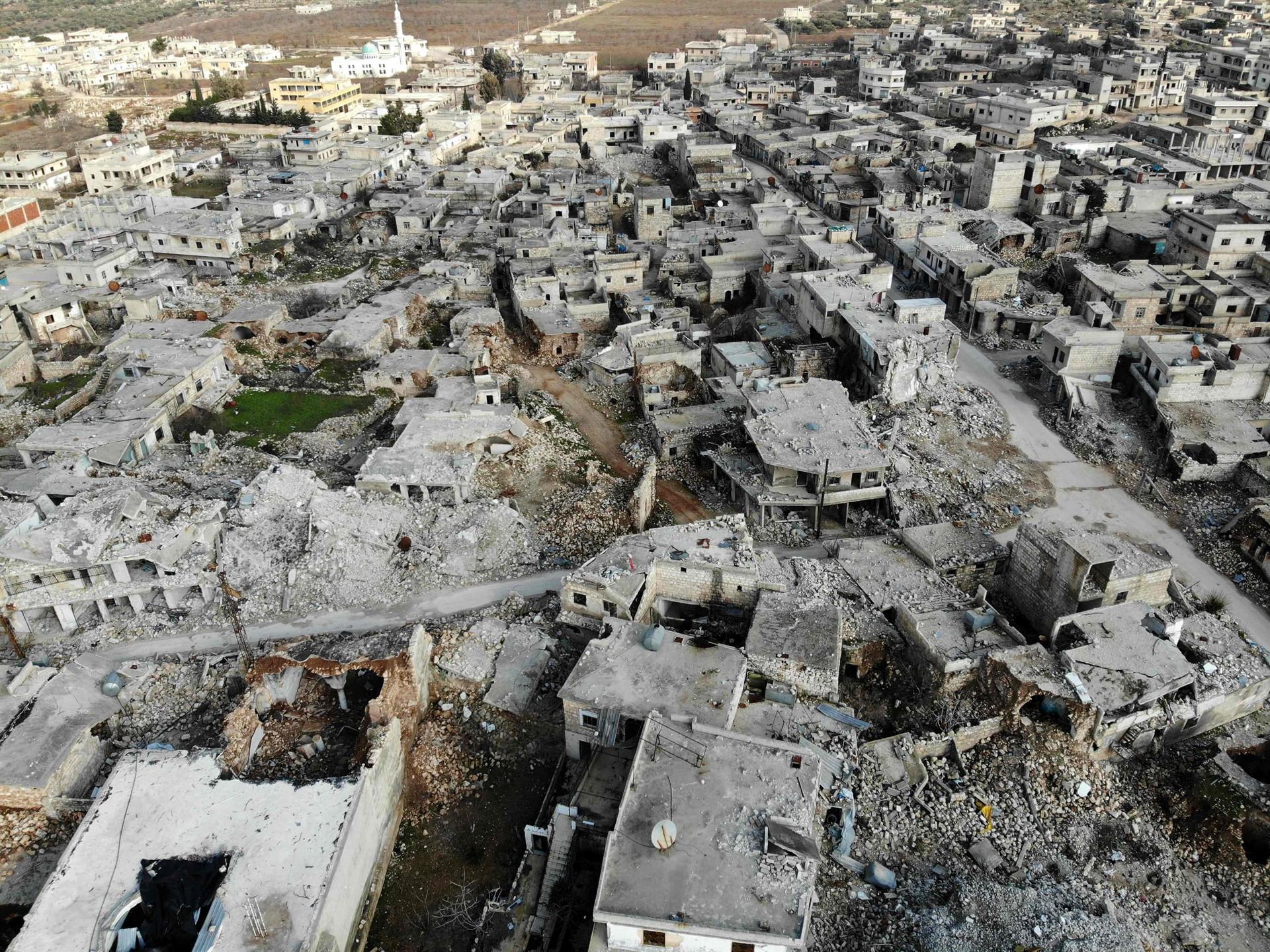
An aerial view taken on Feb. 19, 2020 shows destroyed buildings in the Syrian town of Ihsim in the southern countryside of Idlib. (AFP Photo)
The U.S. will continue to coordinate with Turkey in Idlib, Syria where an ongoing offensive has displaced nearly 900,000 civilians since December, Washington’s envoy to the U.N. Kelly Craft said on Feb. 19.
Speaking at the U.N. Security Council meeting in New York, Craft said Washington "unequivocally" rejects statements by Russian officials "falsely blaming Turkey for the escalation of the violence" in northwest Syria.
"The United States will continue to coordinate with Turkey on diplomatic approaches to restore a cease-fire to the Idlib de-escalation zone and achieve a pullback of Assad regime forces to 2018 Sochi ceasefire," said Craft. "There is no doubt that the Assad regime and Russia, not Turkey, are responsible for orchestrating and executing this military offensive.”
In addition, along with the U.S., the envoys for the U.K. and Germany called for an end to Syrian regime attacks on Turkey's observation posts in Idlib.
Turkey not to abandon Idlib observation posts
In the meantime, Ankara'S U.N. envoy Feridun Sinirlioğlu said that Turkey is not abandoning the observation posts in Idlib.
Speaking at the U.N.SC meeting, Sinirlioğlu said Turkey will continue to respond by all necessary means against any attacks by the Bashar al-Assad regime on Turkish troops.
"We will not withdraw our forces and we will not abandon our observation posts. It is the regime who should withdraw from its current positions until the end of this month," said Sinirlioğlu.
He said Turkish security forces are in Idlib to stabilize the situation and to preserve the de-escalation area.
"Our military presence and reinforcements are fully in line with the Sochi Memorandum of September 2018.
"The only option out of the biggest humanitarian horror story of the twenty-first century is a lasting cease-fire," he said.
He also said Syrians feel abandoned by the world and are awaiting the international community's help in Idlib.
Turkey, Russia should de-escalate the conflict
U.N. Special Envoy for Syria Geir Pederson called on Turkey and Russia to do their part to deescalate the conflict in Idlib.
"Turkey and Russia, as the sponsors of the Idlib de-escalation arrangements, can and must play key role finding a way to deescalate situation now," Pederson told the U.N. Security Council in a teleconference in Geneva.
The envoy said Russian and Turkish delegations met intensively in Ankara, Munich, and Moscow and there had been presidential contacts between the leaders of the two countries. "But no understanding has yet emerged.”
He reiterated the U.N. is alarmed by the rapid deterioration of the humanitarian situation in northwest Syria and the tragic suffering of civilians.
"The potential for further mass displacement and even more catastrophic human suffering is apparent, as an increasing number of people are hemmed into an ever-shrinking space," he added.
Clash between Turkey, Syria would be a 'worst-case scenario'
Turkish President Recep Tayyip Erdoğan said on Feb. 19 that a military operation by his forces to push back a Syrian regime offensive against rebels in northwest Syria was now "a matter of time" after talks with Russia failed to halt the assault.
Turkish troops have already massed inside the Idlib region and more were heading to the border area, bringing NATO member Turkey and Russian-backed Syria close to the brink of direct confrontation.
The Kremlin, which has supported Syria's Bashar al-Assad's push with air strikes, said a clash between Turkish and Syrian forces would be a "worst-case scenario" and Russia would work to prevent the situation from worsening.
Syrian troops supported by Russian warplanes and special forces have been battling since December to eradicate the last rebel bastions in Idlib and Aleppo provinces in what could be one of the final chapters of the nine-year-old civil war.
Nearly one million civilians have fled from airstrikes and artillery barrages towards the closed frontier, overwhelming relief agencies and alarming Turkey, which already hosts 3.6 million Syrian refugees and says it cannot handle more.
Speaking to lawmakers from his ruling Justice and Development Party (AKP) on Feb. 19, Erdoğan said Turkey was determined to make Idlib a secure zone even while talks with Moscow continued. Several rounds of diplomacy had failed to reach an agreement so far, he said.
"We are entering the last days for the regime to stop its hostility in Idlib. We are making our final warnings," said Erdoğan, whose country has the second-largest army in NATO.
"Turkey has made every preparation to carry out its own operational plans. I say that we can come at any point. In other words, the Idlib offensive is only a matter of time."
Russia blocks UN bid to end Syria bloodshed
Meanwhile, Russia blocked a U.N. bid to end the Damascus regime’s brutal assault on Idlib, which also houses several jihadist groups internationally listed as terrorist organizations.
Russia, which along with Iran backs Assad, has repeatedly vetoed U.N. resolutions on the conflict as it hopes for the triumph of the regime.
At the United Nations, diplomats said they were unable to produce a statement on ending the fighting due to Russian objections.
“We tried very hard to have a press statement calling for cessation of hostilities and humanitarian access to Idlib,” said Nicolas de Riviere, the French ambassador to the United Nations.
“Basically Russia said ‘no’, which is very painful,” he told reporters.